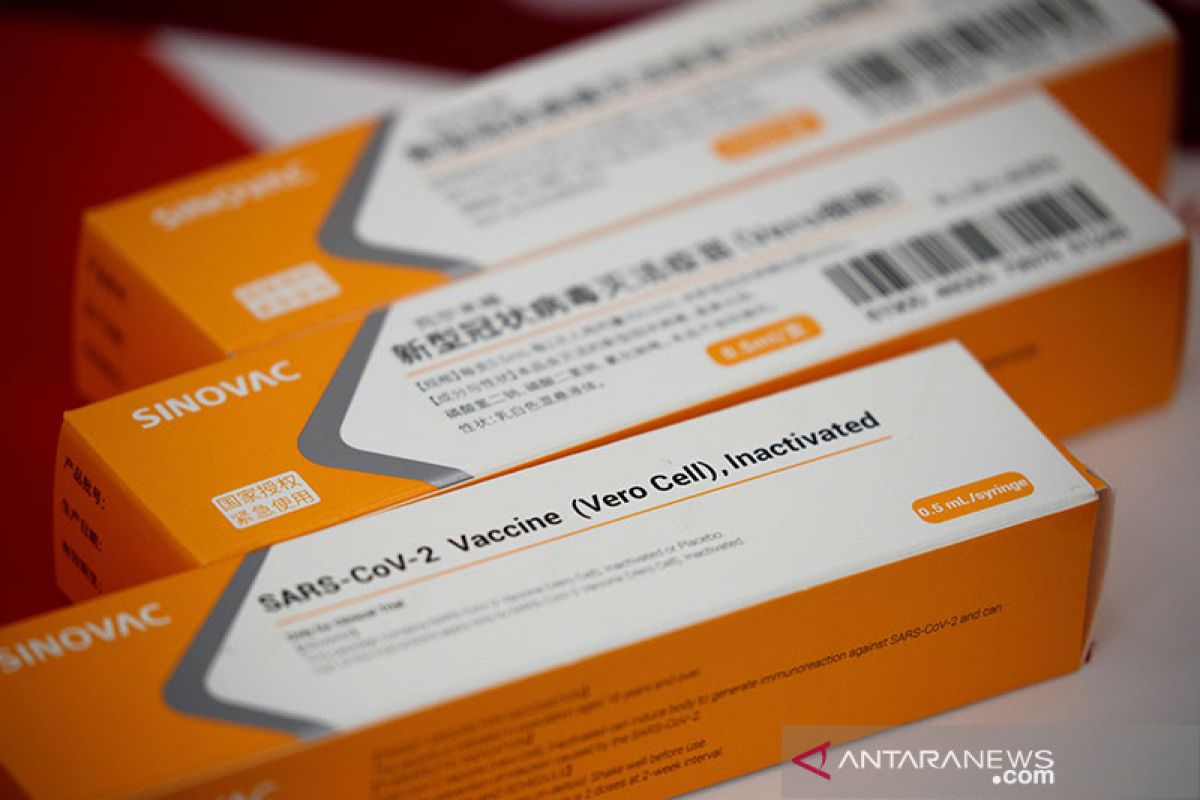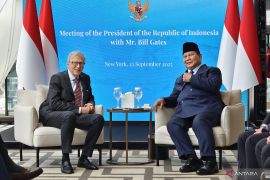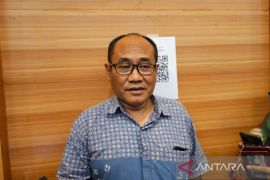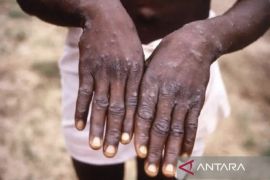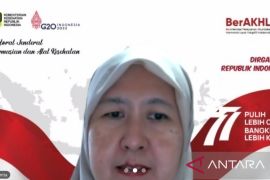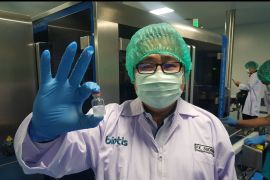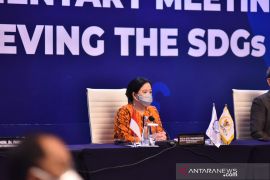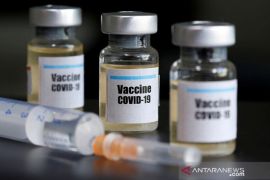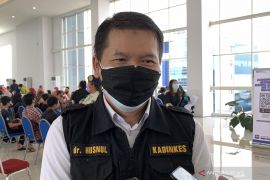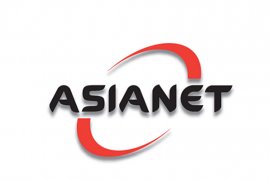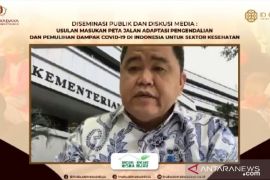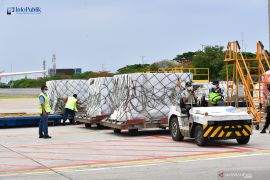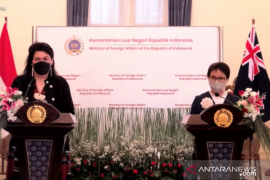Initially, the government had hoped to begin the vaccination program in the third week of December, 2020, with healthcare workers and legal enforcers getting first priority.
The government, however, is still waiting for the Food and Drug Monitoring Agency (BPOM) to issue an emergency-use authorization (EUA) for Sinovac's CoronaVax vaccine.
The delay has been attributed to precautionary measures that are crucial to ensure the vaccine’s safety.
In a recently released on YouTube video, BPOM head Penny Kusumastuti Lukito said the agency is currently observing Sinovac's CoronaVax vaccine, and expects the interim results from the trials of the vaccine in January, 2021.
The observation period for confirming the vaccine's effectiveness usually takes one, three, and six months, hence the EUA cannot be released soon, she explained.
She, however, said Sinovac’s vaccine has met the quality standards for producing medicines.
“There are no critical side effects,” she said of the vaccine that has undergone final stage clinical trials in Bandung, West Java province.
The trials were held in cooperation with Chinese pharmaceutical company Sinovac, its Indonesian partner Bio Farma, and the University of Pandjadjaran.
The third phase clinical trials of Sinovac's vaccine in Bandung began on August 11, 2020 with 1,620 volunteers and so far, they have run smoothly.
Related news: Indonesia to get 370 million vaccine doses by 2022
Indonesia's COVID-19 vaccine inspection team, which comprises the BPOM, the Health Ministry, the Indonesian Ulema Council (MUI), and representatives of Bio Farma, had flown to China on October 14, 2020 to inspect the quality and halal status of the Sinovac and Cansino vaccine candidates.
The BPOM, however, is waiting to check the vaccine’s efficacy, that is whether the vaccine improves antibodies and neutralizes the virus.
The observational period for the vaccine includes a laboratory test of the subjects’ blood samples.
The agency will issue the EUA in line with the guidelines issued by the World Health Organization (WHO) and the US Food and Drug Administration (FDA), Lukito said, adding that an efficacy rate of at least 50 percent would be needed for the vaccine’s approval.
The government’s vaccination program can lower and even end the transmission of COVID-19 in Indonesia, Dr. Daeng M. Faqih, chairman of the executive board of the Indonesian Doctors' Association (IDI), remarked.
"This vaccination program offers huge hope for us all, not only for healthcare workers, but also for all people. [A] Vaccine is our biggest tool to reduce [infections] as low [far] as possible and also stop the transmission of COVID-19," he stated.
The ongoing interventions to curb COVID-19 transmission in Indonesia through the implementation of health protocols have been deemed as not sufficiently effective since the daily confirmed cases have continued to increase by the day, he pointed out.
Faqih attributed the increasing number of positive cases of COVID-19 in Indonesia to the fact that the Indonesian people have not been observing the health protocols in a strict and disciplined manner.
Hence, the vaccination program is expected to be more effective in reducing the transmission of COVID-19 in Indonesia, he explained.
Related news: Year ender - Not the time to let guard down on COVID, govt warns
The effectiveness of vaccines in suppressing COVID-19 cases in Indonesia undoubtedly depends on how successfully the vaccination program is implemented, according to Faqih.
The vaccination program can be successful if all Indonesians are willing to actively participate in COVID-19 vaccination to acquire herd immunity, he noted.
Herd immunity against the SARS-CoV-2 virus that causes COVID-19 can be acquired as long as 60-70 percent of Indonesia's population has immunity to fight the virus, Faqih pointed out.
The Indonesian government has set aside a budget of about Rp73 trillion for procuring COVID-19 vaccines for the 2021 immunization program. It has promised to only procure COVID-19 vaccines that are found safe and have cleared clinical trials, as recommended by the WHO.
Six types of vaccines will be administered in Indonesia based on the Decree of the Minister of Health of the Republic of Indonesia No HK.01.07 / Menkes / 9860/2020, issued on December 3, 2020.
The six vaccines are being produced by PT Bio Farma (Persero), AstraZeneca, China National Pharmaceutical Group Corporation (Sinopharm), Moderna, Pfizer Inc and BioNTech, and Sinovac Biotech Ltd.
Related news: Task Force ensures regional readiness to distribute COVID-19 vaccines
In early December, 1.2 million doses of the COVID-19 vaccine produced by Sinovac arrived in Jakarta, as part of the first phase of procurement of three million doses in the form of the inactivated SARS CoV-2 virus.
Coordinating Minister for Economic Affairs, Airlangga Hartarto, has said that several COVID-19 vaccines apart from Sinovac's are scheduled to arrive in Indonesia in the second quarter of 2021.
He said vaccines from AstraZeneca, Pfizer, and a vaccine from the Covax program are expected to arrive in the country in the second quarter of 2021.
The government will prioritize COVID-19 vaccination for healthcare workers, as they are classified as a vulnerable group.
IDI doctors said they are ready to be vaccinated and urged the public to not hesitate to participate in the vaccination program.
President Joko Widodo (Jokowi) recently announced that he is ready to receive the first vaccine shot in the country, and that the COVID-19 vaccine will be administered at no cost to the public.
"I have already conveyed that I will be the first to be injected with the vaccine. If everyone is vaccinated, it means we are back to normal again," Jokowi noted.
The President affirmed that at least 70 percent of Indonesia's population out of a total of about 260 million people needs to be vaccinated.
In the meantime, a coalition of vaccine volunteers called "Kawan Vaksin", which literally means 'Friends of Vaccines’, set up by the Indonesian Doctors' Association (IDI) in 34 Indonesian provinces, said its members are ready to be the first to get COVID-19 vaccine shots with President Jokowi.
Dr. Iswanto Idji, the national coordinator of Kawan Vaksin, said the coalition was formed in various regions to help make the implementation of health protocols successful and in response to the low awareness among the public about vaccines, with many people believing in hoaxes circulated about the vaccine.
"We think we could help the nation to fight the pandemic. [A] Vaccine is one of the government's efforts to expedite eradication of the COVID-19 pandemic, so that we can soon restore all dimensions of people's lives. Kawan Vaksin is present in the regions to encourage literacy and community participation in the vaccination program," he said.
In the meantime, President Jokowi recently replaced Health Minister Terawan Agus Putranto with Budi Gunadi Sadikin amid a surge in COVID-19 cases in the country, and appointed diabetes expert Dante Saksono Harbuwono as Deputy Minister of Health (Wamenkes)
Shortly after being officially installed on December 22, 2020, Sadikin said his first task as Health Minister will be to bring the COVID-19 pandemic under control.
Measures to bring the pandemic under control need to be inclusive so that all citizens can resume their normal lives, he added.
The new Health Minister and his deputy face a daunting task as COVID-19 cases in Indonesia have been increasing significantly, in fact, the country’s COVID curve has never flattened.
On December 28, 2020, the Task Force for COVID-19 Handling reported that Indonesia added 5,854 confirmed COVID-19 cases and 6,302 recoveries in a span of 24 hours.
As of December 28, 2020, the total number of recoveries were pegged at 589,978, while the number of confirmed cases stood at 719,219.
With 215 more people succumbing to the virus in a single day, the death toll reached 21,452, since the government announced its first COVID-19 cases on March 2, 2020.
Related news: AstraZeneca, Covax, Pfizer vaccines expected to arrive in 2021
Related news: Government allocates Rp73 trillion for vaccine procurement
Editor: Rahmad Nasution
Copyright © ANTARA 2020
